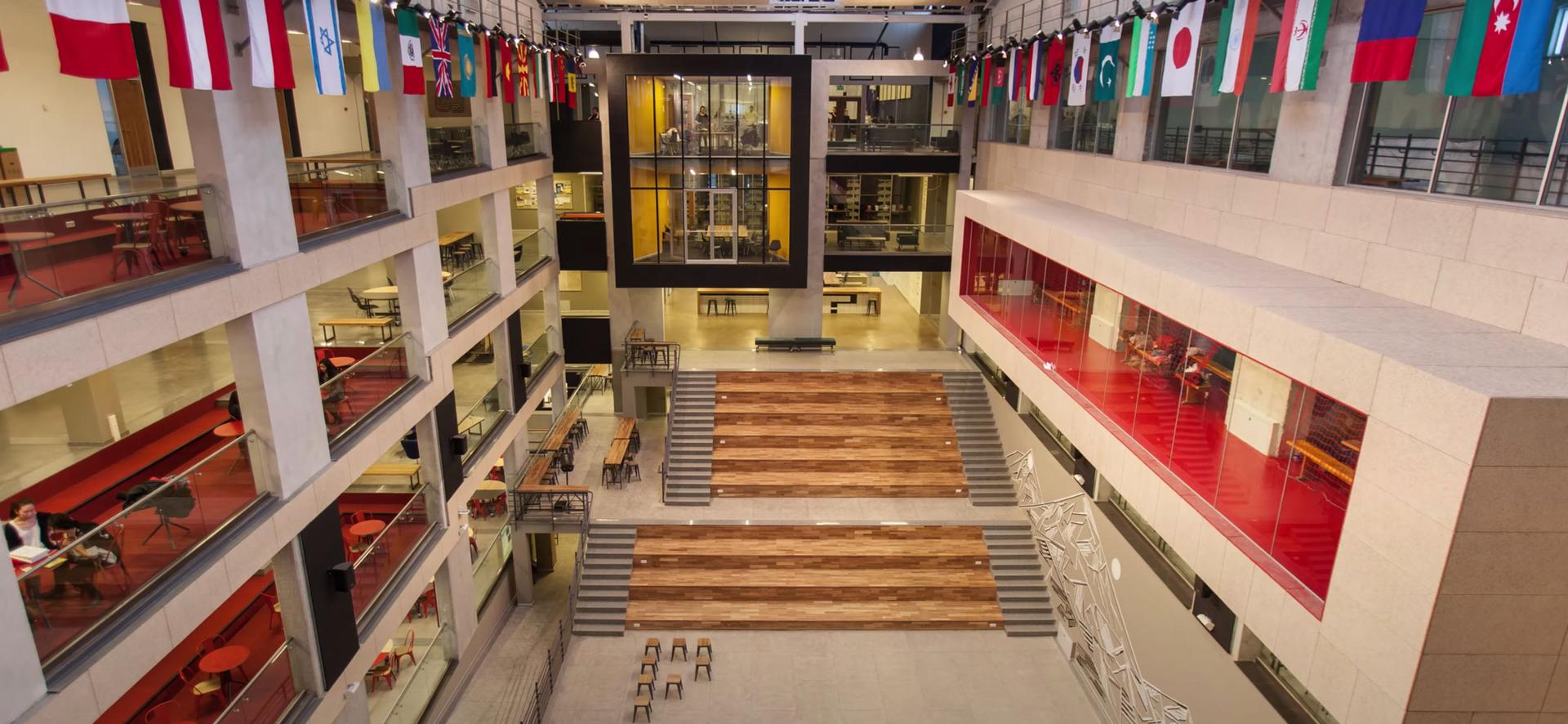On a recent morning, students at the American University of Central Asia (AUCA), in Bishkek, Kyrgyzstan, gathered for the school’s annual Afghan culture day.
Dressed in traditional clothing representing ethnicities from all over Afghanistan, students performed Afghan dances and recited poetry on a small stage decorated in black, red and green balloons — the colors of the old Afghan flag.
“People must know that there is hope and a lot of happy faces in Afghanistan — it’s not all about killing and crying and the Taliban.”
“People must know that there is hope and a lot of happy faces in Afghanistan — it’s not all about killing and crying and the Taliban,” said Anwar, who fled to Kyrgyzstan from Kabul, last fall.

Anwar’s full name, as well as other students in this story, isn’t being used in order to protect the identities of families still in Afghanistan.
The Taliban takeover has changed life for an entire generation of Afghan students. Some young Afghans, like Anwar, were evacuated from Afghanistan to Kyrgyzstan, a former Soviet country that borders western China. Some got out of Afghanistan on flights, while more than 100 others had to sneak out of the country by car.
Anwar and other students hoped the cultural event would offer a different image of Afghanistan than what the media typically portray. Still, Afghan students in Kyrgyzstan expressed a tremendous sense of loss, both for Afghanistan and their futures.
Pressure to evacuate
Early last spring, Anwar was looking forward to going back to in-person classes at the American University of Afghanistan (AUAF), after more than a year of remote learning due to the coronavirus.
But for Anwar, a 21-year-old computer sciences student, that day never came. As the summer progressed, the Taliban started to swiftly take over provinces in Afghanistan.
“I was sure that I will not be able to go back to university because they [the Taliban] will not let me,” Anwar said.
As the Taliban advanced toward Kabul over the summer, AUAF’s president sent Anwar and the other students a message that the school would not reopen this fall as planned.
When Kabul fell in August, the students received another message: They should prepare to evacuate the country.
Related: Canada promised to resettle 40,000 Afghans. Many are still waiting for answers.
Some AUAF students feared retaliation from the Taliban just for attending the school, which is partially financed by USAID. And many students received scholarships provided by the US Embassy in Kabul, sparking fear among students that they might receive direct reprisal from the Taliban for receiving support from the US government.
Security has always been a concern at the school, but for Anwar, the risks were worth it because studying at the AUAF gave him a “sense of peace and brotherhood.”
After Kabul fell, the Taliban quickly took over the school’s campus.
In the months that followed the Taliban takeover, more than 200 students were evacuated to the American University of Iraq, Sulaimani and the American University of Central Asia (AUCA), in Bishkek, Kyrgyzstan.
“It was a team operation of incredibly dedicated people who basically didn’t sleep for six weeks.”
“It was a team operation of incredibly dedicated people who basically didn’t sleep for six weeks,” said Jonathan Becker, the executive vice president of Bard College in New York and the acting president of AUCA, speaking about the effort to bring the students to Kyrgyzstan.
Related: The spotlight has faded on Afghanistan, but not the urgency for Afghans seeking safety
Becker worked with a team spread between New York, Kyrgyzstan and Afghanistan to evacuate 177 Afghan students to AUCA. The university in Kyrgyzstan shares a close partnership with Bard College that allows AUCA students to obtain US-accredited degrees.
The students that Becker and the others helped evacuate included some from AUAF, current AUCA students from Afghanistan who were visiting home during the summer break and alumni who had already graduated from AUCA.

The team faced numerous roadblocks.
Early attempts to fly students out of the country by plane proved impossible in the chaos after Kabul fell. Eventually, Bard and the others who organized the evacuation decided to move students out of the country by car to the border with Pakistan, and then fly them to Kyrgyzstan.
‘You have no right to speak anymore’
One group of four female students left Kabul at midnight with a driver who claimed to be their relative when they got stopped at Taliban checkpoints. A student named Nil who rode in the car said she dressed conservatively.
“I was wearing like, hijab … we were all wearing black scarves. Huge ones. Because while leaving the country we had to have a proper hijab, proper clothes.”
Nil hid her laptop in a bag with her clothes in hopes that the Taliban wouldn’t suspect she was a student.
“We were told that we should not say that we are American University students,” Nil said.
When the women arrived at the Pakistani border, a large crowd had assembled and two Taliban members holding sticks told her not to get too close to any of the men. Nil told them she would comply but one uttered a harsh message in response.
“He told me, ‘Look girl, you have no right to speak anymore. We are not like the previous government [that gave] you the freedom to speak with a stranger.’”
Nil feared they might have to return to Kabul, but the group was eventually allowed over the border into Pakistan, where they continued their journey by plane to Bishkek.
Becker said the students never would have made it to Kyrgyzstan without the assistance of mid-level officials in countries like Pakistan. They stepped in to help the students secure the necessary paperwork.
Rhythms of life, on pause
For the students who remain inside Afghanistan today, they face increasing barriers to their education.
Zarlasht Sarmast, a graduate student in international relations at AUCA, points out that half of Afghanistan’s population are youth.
Since the Taliban took over the country, women’s access to education has quickly shrunk. Zarlasht said that the Taliban still have not enforced strict rules around women’s education, but the signs of change are troubling.
“In some provinces like Herat, women and girls are going to school until grade 12 [as well as] university,” Sarmast said. “But in some provinces, girls are only allowed to go to school until third grade and in some, not at all.”
Sarmast said that Afghanistan’s current economic collapse further restricts education access, as universities are closing due to students’ inability to pay tuition.
“You cannot go to study if you’re worrying about your mom not being able to work, and you don’t have an income and thus, you don’t know what you’re going to eat the next day.”
“You cannot go to study if you’re worrying about your mom not being able to work, and you don’t have an income and thus, you don’t know what you’re going to eat the next day,” Sarmast said.
Even for students lucky enough to secure scholarships to study abroad, leaving the country can be tricky because so many of the embassies inside Afghanistan are closed.
All of these factors make the arrival of the Afghan students to Kyrgyzstan even more extraordinary.

Nil, the student who fled Afghanistan by car, said it felt like the entire rhythm of life ended after Kabul fell — as if someone abruptly hit the stop button on a musical recording.
As Anwar and his fellow students performed the traditional Attan dance at AUCA, the music played again. Students still in Afghanistan hope it’s just on pause for a while.
And many Afghan students in Kyrgyzstan dream of returning home one day to make their country a better place.
We rely on support from listeners and readers like you to keep our stories free and accessible to all. Monthly gifts are particularly meaningful because they help us plan ahead and concentrate on the stories that matter. Will you consider donating $10/month, so we can continue bringing you The World? Donations made between now and Dec. 31 will be matched 1:1. Thanks for investing in our work!
